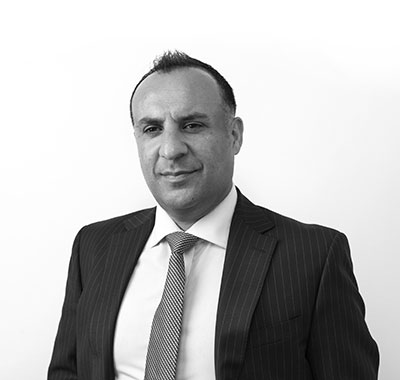Computer Misuse Act Offences
The Computer Misuse Act 1990 is the main piece of legislation in the UK which criminalises actions relating to the unauthorised access or modification of data. Penalties for Computer Misuse Act offences can be extremely serious, and therefore seeking specialist legal advice and representation is crucial.
At JD Spicer Zeb, our highly experienced criminal law solicitors are available to provide immediate support if you are facing an allegation of committing a Computer Misuse Act offence. These matters are treated extremely seriously by prosecuting authorities, but with the support of our team, you can rest assured that you will have access to the highest standard of criminal defence.
Whilst representation from a duty solicitor will be available when you are facing Computer Misuse Act penalties, we strongly recommend that you choose to work with our team so that we can provide you with a robust defence.
Get in touch
Why choose JD Spicer Zeb?
- 1000s Cases Dropped
- 24/7 Emergency Phonelines
- 100s Years Combined Experience
 Read all Reviews
Read all Reviews
Recent Cases
There is limited recourse for you if you are falsely accused. Click a selection of the cases we have covered. The best thing you can do is to instruct an excellent solicitor from the outset.
Our specialist expertise in handling criminal offences under the Computer Misuse Act means that we are in the strongest position to support you in achieving the best outcome available for your case. Our first priority will be to help you avoid conviction, but in cases where this may not be feasible, we will take every measure to secure the most lenient sentence possible.
Our Computer Misuse Act solicitors provide:
- 24/7 legal support in person and over the phone, 365 days a year
- Representation anywhere in England or Wales
- Accredited Police Station Representatives to support you during a police interview
- Clear, effective legal advice in any language (see our languages spoken)
How can we help?
Common questions
We always work with the most experienced and best leading UK barristers, KCs (Kings Counsel). We cover all criminal cases 24/7 at the police station and court. Offices in London, Birmingham, and Manchester cover cases across England and Wales. We can offer Legal Aid and affordable Private fee agreements. We can see you the same day, including virtually. Our Senior Partners supervise all of our cases.
How quickly do you respond?
We respond quickly even during out of hours. We do not get our work by paying for online adverts but based on the fact that few criminal law firms can match our 45 years of experience. Most of our cases are still from word-of-mouth recommendations from satisfied clients. We are called daily by dissatisfied clients from firms with less experience than us. We respond very quickly to new enquiries. We know what clients seek and so we update clients rapidly.
Can you get cases dropped?
Yes, read about the recent cases we've helped our clients with here.
We always keep you updated and give straightforward advice. We will get cases dropped early where the case is weak or should not be prosecuted. We will be upfront with you about where you can benefit from a good result with an early guilty plea, such as a discount on your sentence. As we work on cases across all levels with clients from all walks of life, we are excellent at giving clear, spot-on advice. As an established firm, we can allocate a whole team to your case often at short notice to secure evidence to minimise the damage to you.
Have you won any awards?
OUR PROFESSIONAL BODY THE LAW SOCIETY AWARDED US IN OCTOBER 2020 WITH THE EXCELLENCE IN CLIENT SERVICE AWARD AND STATED -
"JD Spicer Zeb demonstrated a clear commitment to client service through their work with vulnerable and diverse individuals in what can be severely traumatic circumstances".
Do you offer free consultations?
Where it is possible, we aim to provide an initial consultation to you. If we can speak to you, we can if required inform you about –
- Whether we can take the case on and our relevant experience.
- Public and private funding benefits.
- Assistance in applying for legal aid where we are likely to accept instructions.
- An outline of options in police interview only. We will not advise you on which option to adopt.
- Providing our free written guide explaining the police station process.
- The gravity of routine and day-to-day offences you face.
- Consequences of not attending the court or police station.
- Consequences of interfering with any witnesses.
- Retaining any evidence in support of your case.
- If possible an outline of the elements of the offence that the police or CPS must prove.
- This consultation will normally be by telephone or email and will only be for as long as we deem necessary to establish if we can act for you. If we cannot usefully give you any advice in this manner then we will not continue with the consultation. We will not discuss the case in depth for you to be able to decide on your plea or any significant aspect of the case, as this cannot be undertaken informally.
- Referring you, if possible, to other firms for matters out of our specialism or if we cannot help.
Consultations do not apply to the following cases –
- If we do not intend to take the case on.
- Road Traffic cases, drink driving, drug driving, driving bans, speeding, no insurance, mobile phone use, points etc.
- In all cases where we do not have the capacity to take your case or the availability of suitably qualified staff to provide an initial free consultation. This is applicable in all cases but especially where a more senior lawyer is required because of your personal needs or the complexity of the case.
- Harassment/stalking/ coercive behaviour/malicious communications or road traffic cases and most sensitive cases. These cases are often too complicated to assess in short consultations.
- The locations concerned may be too distant to represent you adequately or it may not be cost-effective for you or us.
- The case is too complicated to assess or raises various charges or facts, complexity, or history to be considered informally or in a short consultation.
- In most Legal aid transfers where legal aid is granted to another firm except in very grave cases, we may assess the case and merits for a transfer.
- If your relationship has broken down with your existing solicitor or several solicitors.
- If you have been released under investigation and have already had a police station attendance.
- If you hold legal aid with another firm and seek a second opinion.
- If you are calling on behalf of the client as a friend or family member unless you have full authority and full facts.
- To businesses.
- Advising whether you were given good advice by your other solicitor.
- Whether to decide to plead guilty or not guilty.
- Whether you have an arguable defence in law or factually complicated defences.
- Any advice you have had after your first court appearance.
- Any advice on appeal on conviction or sentence.
- If we feel we are unable to communicate with you.
- If we are likely to be conflicted or breach our professional rules.
Speak to our Computer Misuse Act solicitors today
For a free initial consultation on your legal position and the available options, contact our local offices in London, Birmingham or Manchester.
For urgent advice at any time of day or night regarding Computer Misuse Act offences, please call our Emergency Number 07836 577 556.
You can also email: solicitors@jdspicer.co.uk or fill out our online enquiry form and we will get back to you quickly.
Our expertise with Computer Misuse Act offences
Our criminal defence solicitors have over 45 years of experience in supporting clients accused of a range of offences, including Computer Misuse Act cases. Our collective experience also ensures that we have the knowledge and expertise to provide a firm defence against allegations related to the Computer Misuse Act, no matter how complex your case may be.
Offences under the Computer Misuse Act are often punishable by prison sentences. With this in mind, it will always be in your best interests to seek specialist legal advice when facing allegations of this nature.
Our criminal defence team includes several accredited police station representatives who will be able to provide advice and representation on a 24/7 basis to anyone accused of a Computer Misuse Act offence.
Over the years, we have achieved a number of positive results for our clients, including in both the Magistrates’ and Crown Court. We have also established strong relationships with some of the country’s leading barristers, meaning we will be able to provide you with access to expert legal representatives with the skills needed to secure the best possible outcome for your case.
If you are accused of a Computer Misuse Act offence, we understand the impact this is likely to have on you and your family. We therefore provide a close personal service that allows you to keep track of the various issues that may have a bearing on your case.
We are accredited by the Law Society for Criminal Litigation and have also achieved Lexcel accreditation, reflecting the high standards of our legal practice.
As a testament to the high standards of client care our team provides, we frequently receive referrals and recommendations from clients who have been satisfied with our legal services which we have been providing for over 45 years.
Pre-charge bail
Being released on pre-charge bail (often just referred to as released on bail) is a common outcome following an initial interview with the police. Where this happens, the police will continue their investigation before they come to a final charging decision.
During this period, you will be subject to certain bail conditions. For example, there may be restrictions of where you can go, or there may be requirements for you to attend the police station on a certain day.
To find out more in relation to pre-charge bail, please use the links provided below:
- Pre-charge bail and Released Under Investigation (RUI)
- On Bail But Not Charged - What Does It Mean?
- How long can you be on bail without charge UK?
Common questions about offences of the Computer Misuse Act
What is the Computer Misuse Act?
The Computer Misuse Act 1990 concerns itself with the lawful access and use of computer systems. It criminalises the acts of accessing and modifying data without the consent of the owner.
Causing a computer to perform a certain function with the intent of accessing specific programs or data would be an offence where:
- Access to the program or data is unauthorised
- The person is knowingly causing the computer to cause that function
The Act has been updated on various occasions, most recently in 2015.
How is a computer defined under the Computer Misuse Act?
The Computer Misuse Act does not provide a specific definition of a computer, as evolving technologies would likely render a definition as obsolete.
Instead, the courts have dealt with the definition. In DPP v McKeown, DPP v Jones ([1997] 2 Cr. App. R. 155, HL, at page 163), Lord Hoffman defined a computer as "a device for storing, processing and retrieving information."
This means that the unauthorised access of mobile phones, tablets, and laptops are criminal offences under the Act.
Why was the Computer Misuse Act introduced?
The Computer Misuse Act was introduced in the UK to directly address and combat unauthorised access, misuse, and hacking of computer systems. The purpose of the Computer Misuse Act is to protect the integrity and security of computer data and networks by making these activities illegal and punishable under the law.
Previous legislation, such as the Forgery and Counterfeiting Act 1981, did not provide sufficient grounds for prosecuting authorities to bring forward convictions in many instances. For this reason, the Computer Misuse Act was introduced.
How many offences are covered by the Computer Misuse Act?
There are several offences which fall under the Computer Misuse Act 1990. As per the Crown Prosecution Service (CPS), the following offences apply:
- Section 1: Unauthorised access to computer material
- Section 2: Unauthorised access with intent to commit or facilitate commission of further offences
- Section 3: Unauthorised Acts with intent to impair, or with recklessness as to impairing the operation of a computer
- Section 3ZA: Unauthorised acts causing, or creating risk of, serious damage
- Section 3A: Making, supplying or obtaining articles for use in offence under Section 1, 3, or 3ZA
It is also important to note that consideration will also be given as to whether a Computer Misuse Act offence is committed as a precursor to another offence such as fraud or blackmail.
What kinds of acts constitute offences under the Computer Misuse Act?
Many different acts can constitute an offence under the Computer Misuse Act 1990, even where they may seem trivial. The fact that the various acts may be done in the context of a relationship, a breakup, or at work does not matter, they will nonetheless be crimes. For instance, the following acts could be prosecuted as Computer Misuse Act offences:
- Deleting photos from someone else’s phone, laptop or device without their consent
- Looking through or deleting texts or social media messages on someone else’s phone, laptop or device without their permission
- Sending photos, messages, emails or data from someone else’s phone, laptop or device to your phone without asking them whether you can do so
Thus, going through your partner’s phone without his consent in order to discover whether he has been unfaithful is a criminal offence. Going onto your friends phone without her permission and sending yourself photos which you wish to have is a criminal offence. Going onto your ex-partner’s tablet and deleting photos of the two of you is a criminal offence.
What do Computer Misuse Act penalties include?
Computer Misuse Act consequences and penalties will vary depending on a number of factors. The following sentencing guidelines will apply to these types of offences:
- Unauthorised access to computer material – Maximum sentence of 2 years imprisonment
- Unauthorised access with intent to commit or facilitate commission of further offences – Maximum sentence of 5 years imprisonment
- Unauthorised Acts with intent to impair, or with recklessness as to impairing the operation of a computer – Maximum sentence of 10 years imprisonment
- Unauthorised acts causing, or creating risk of, serious damage – Maximum sentence of 14 years imprisonment
- OR life imprisonment where the offence caused or created significant damage to human welfare or national security
- Making, supplying or obtaining articles for use in offence under Section 1, 3, or 3ZA – Maximum sentence of 2 years imprisonment
Contact our criminal law solicitors today
For urgent specialist advice, immediate representation or to speak to us confidentially about a Computer Misuse Act offence or any other criminal matter, please do not hesitate to contact our dedicated team of criminal defence lawyers in London, Birmingham and Manchester by telephone:
- City of London: 0207 624 7771 - our senior Solicitors and Partners can meet by appointment in the City.
- Brent & Camden London Office: 0207 624 7771
- Manchester Office: 0161 835 1638
- Birmingham Office: 0121 614 3333
Or email: solicitors@jdspicer.co.uk
Alternatively, you can fill out our quick online enquiry form and we will get back to you as soon as possible.
24/7 legal representation for Computer Misuse Act offences
For immediate representation and advice, you can contact our emergency number 07836 577556 and we will provide you with the urgent assistance you need.
How can we help?
Useful Information
- How can I get the CPS to drop the charges against me?
- How can I get the police to drop charges against me?
- How can I get the police to caution me?
- Police Stop and Search UK
- Pre-charge bail - What You Need to Know
- Read our Police Station Advice Guide
- Recovering Your Property From The Police
- Released Under Investigation - What You Need to Know
- Types of Evidence used in Law
- Voluntary Police Interview - What You Need to Know
- What is a 'No further action' letter?
- What to expect in Police Custody
- Why Choose a Private Solicitor for a Magistrates' or Crown Court Case?
-
- Umar Zeb
- Senior Partner - Head of Private Client Crime
-
- Lisa Nicol
- Managing Partner - Head of Crime & Serious Cases
-
- James O'Donnell
- Partner Crime - Serious Cases
-
- Sanjay Cholera
- Partner Crime Advocacy
-
- Peter Mulhearn
- Consultant Crime Solicitor
-
- Danny Parkash
- Crime Solicitor
-
- Mimma Sabato
- Barrister
-
- Richard Souper
- Consultant Crime Solicitor
-
- Jonathan Lynn
- Solicitor
-
- Samuel Oduntan
- Solicitor
-
- Barry Linnane
- Crime and Extradition Solicitor
-
- Stuart Lloyd
- Solicitor
-
- Robert Wong
- Crime and Extradition Solicitor
-
- Maeve Carroll
- Paralegal
-
- Rebecca Forbes
- Paralegal
-
- Sachelle Gilbert
- Paralegal













